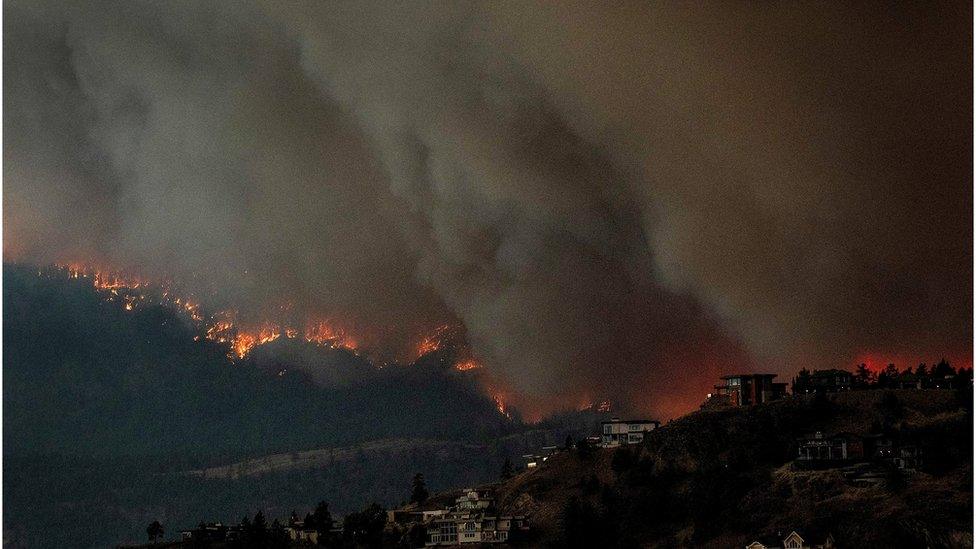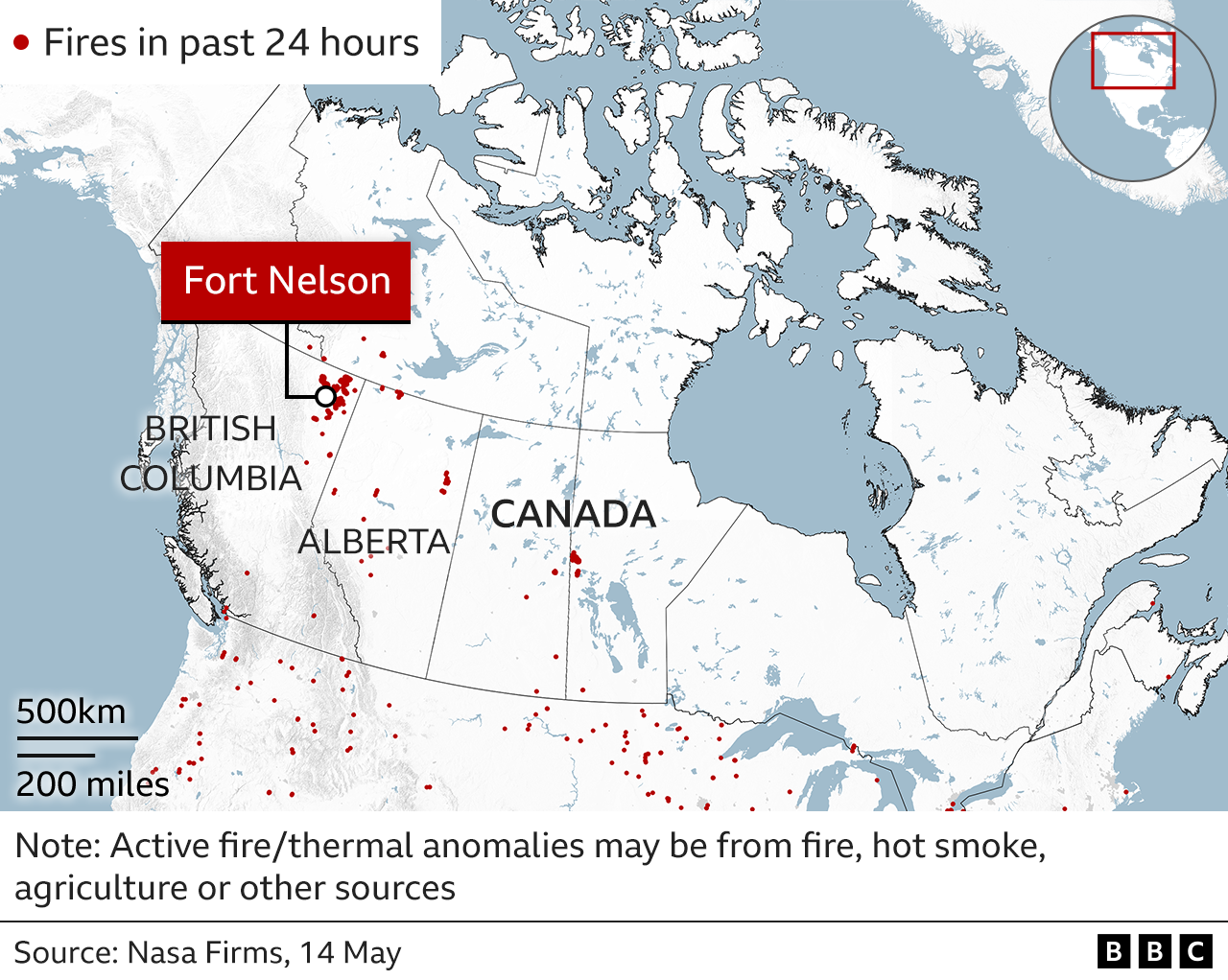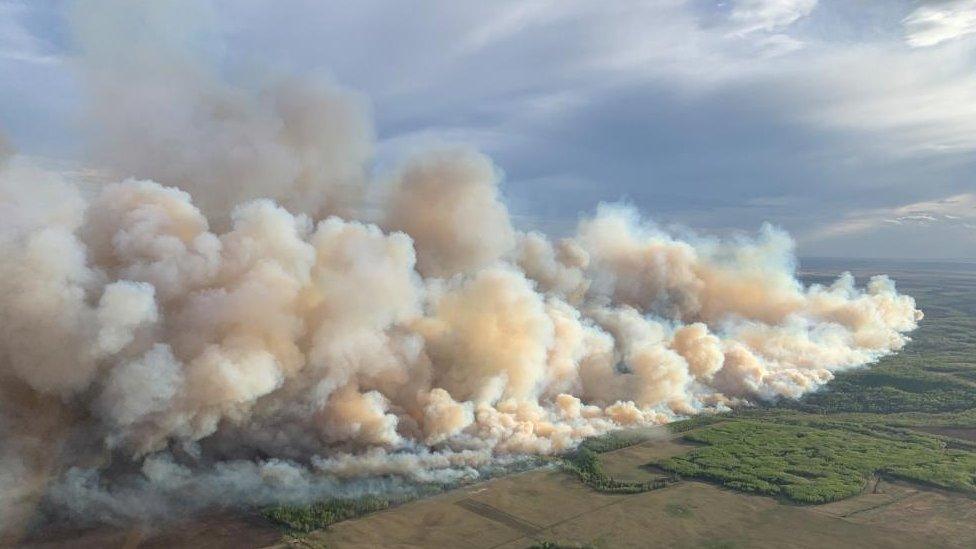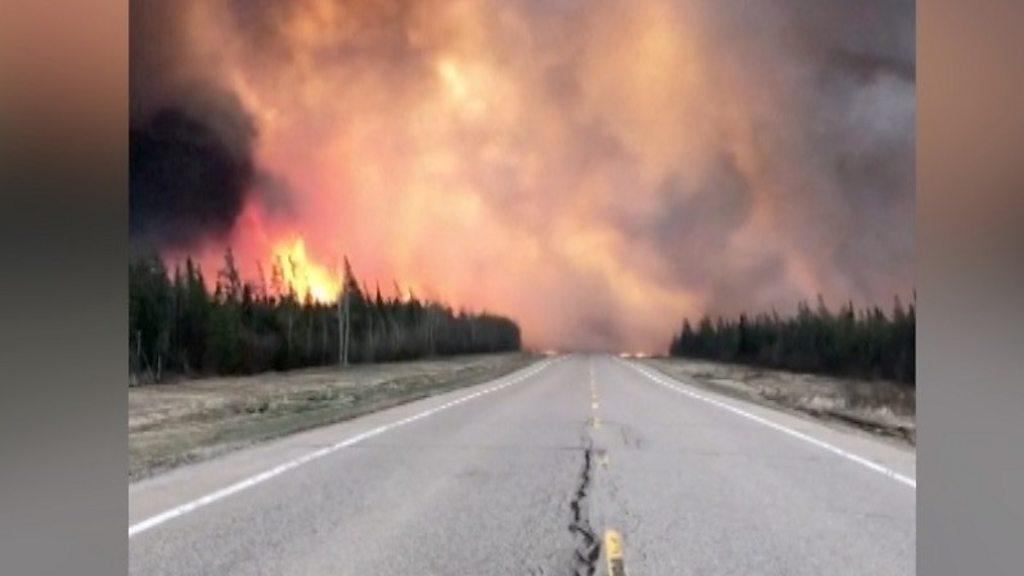Why is Canada having so many wildfires this season?
- Published

Smoke and flames from wildfires serve as a backdrop for homes across Okanagan Lake in West Kelowna, British Columbia, Canada
Thousands of people in western Canada are facing the wrath of wildfires this week amid severe drought.
Some six thousand people were told to evacuate Fort McMurray, Alberta, where 90,000 residents were forced to flee during the 2016 wildfires.
More than 3,000 others were ordered to leave Fort Nelson, British Columbia, where a fire is burning 2.5km (1.5 miles) from the town.
Evacuation alerts were also issued in the provinces of Alberta and Manitoba.
Smoke from the fires has triggered air quality alerts in Canada and the US.
Here's what to know about the fires.
Where are they?
There were several fires burning across Canada as of Tuesday, with a few dangerously close to towns and cities.
One is near Fort Nelson, a town in the north-eastern corner of British Columbia, about 1,600km from Vancouver.
Some 3,400 people live in Fort Nelson and the Fort Nelson Indian Reserve. Most of them have since been evacuated due to the Parker Lake wildfire that is burning nearby.
On Tuesday, hundreds of people were also forced to evacuate near Fort McMurray in northern Alberta due to a fire burning 13km from the city. A 2016 wildfire in Fort McMurray destroyed 2,400 homes.
Residents in the city itself and other surrounding neighbourhoods are on an emergency evacuation alert, meaning they could be asked to leave at any moment if the fire grows.
In Manitoba, 550 people were evacuated in the north-west of the province due to a wildfire that started on Thursday near the community of Cranberry Portage.
The wildfire had grown to 31,600 hectares (316 sq km) as of Tuesday afternoon - nearly the size of Manitoba's largest city, Winnipeg.
It spread at an unprecedented speed over the weekend, officials said, and could take weeks to be put out.
"I've been working in wildfires for 40 years. I've never seen a fire move like this fire moved," Earl Simmons, Manitoba's wildfire director, told reporters on Monday.
The Canadian Interagency Forest Fire Centre estimates there are 135 active fires across the country and 39 of those are out of control.

How did the fires start?
The Parker Lake fire near Fort Nelson began after high winds knocked over a tree and it crashed on to a power line and caught fire, Rob Fraser, Mayor of the Northern Rockies Municipality, told CBC News, external last week.
British Columbia officials listed the fire as potentially human-caused, without elaborating.
The blaze in Cranberry Portage is believed to have started after a lightning strike, CBC News, external reported.
It's unclear exactly how the fires in Alberta started.
What causes wildfires?
There are two common sources of wildfires in Canada: lightning and human beings, Gordon McBean, a geography and environment professor at Western University, told the BBC.
Paul Kovacs, executive director of the Institute for Catastrophic Loss Reduction at Western University, noted that if a large storm is moving across Canada, the storm can cause lightning in one place that starts a fire and then in another place that starts a separate fire.
But Canada's vast land and warming temperatures because of climate change are also playing a part, Prof McBean said.
Warming temperatures in particularly dry regions of Canada, like the north-west provinces, can make those areas "more vulnerable and likely to have fires occur", he said.
Watch: Plumes of wildfire smoke block Canadian motorway
Is this an early start to the season?
For years, Canadian wildfire season started in July or August, but in the past 20 years the wildfire season has been starting earlier and earlier in the year, Mr Kovacs told the BBC.
This year's wildfire season comes as the country reels from its worst fire season on record in 2023, when roughly 18.5m hectares of land had burned - an area about the size of North Dakota. On average, just 2.5m hectares typically burn in Canada each year.
Mr Kovacs noted that while the wildfires have started early again this year, as is becoming normal, last year at this time there were more fires than there are right now.
"Last year was extraordinarily early start," he said.
But Mr Kovacs predicted this year would not be as bad as last year.
Federal government officials warned earlier this year of the possibility of another "catastrophic" wildfire season due to warmer-than-usual weather.
But wildfire season depends heavily on weather conditions as summer progresses.
Related topics
- Published11 May 2024

- Published13 May 2024

